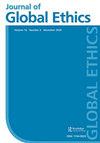Protection as connection: feminist relational theory and protecting civilians from violence in South Sudan
Q2 Arts and Humanities
引用次数: 4
Abstract
Abstract The direct protection of civilians from the violence and harms of armed conflict is most often understood in fixed, identity-centred terms: of what protection is, where it is located, of who provides it, who receives it. Such analyses often conceal the relational nature of civilian protection: how it is co-created by actors in and through their relationships with one another and the protection architectures they operate within. In this article, I explore how a feminist relational approach helps to illuminate these underacknowledged dynamics of civilian protection. Using protection of civilians in the context of the civil war in South Sudan as an example, I highlight how relationships shape protection, and how a relational approach can illuminate a richer view of protection actors, action, and spaces. Drawing from the example of United Nations police mass cordon and search activities, I also demonstrate how relationships between peacekeepers and displaced communities are shaped by protection architectures. I argue that a relational approach can illuminate unjust structures, create important opportunities for new research, and assist in questioning and reorienting dominant peacekeeping strategies.作为联系的保护:女权主义关系理论与保护南苏丹平民免受暴力侵害
摘要直接保护平民免受武装冲突的暴力和伤害,通常以固定的、以身份为中心的术语来理解:保护是什么,保护在哪里,谁提供保护,谁接受保护。这种分析往往掩盖了平民保护的关系性质:行为体如何通过彼此之间的关系以及他们在其中运作的保护架构共同创造平民保护。在这篇文章中,我探讨了女权主义的关系方法如何有助于阐明这些未被充分认识的平民保护动态。以南苏丹内战背景下的平民保护为例,我强调了关系如何塑造保护,以及关系方法如何能够阐明对保护行为者、行动和空间的更丰富看法。我还以联合国警察大规模警戒和搜查活动为例,展示了保护架构如何塑造维和人员与流离失所社区之间的关系。我认为,关系方法可以阐明不公正的结构,为新的研究创造重要机会,并有助于质疑和调整占主导地位的维和战略。
本文章由计算机程序翻译,如有差异,请以英文原文为准。
求助全文
约1分钟内获得全文
求助全文

 求助内容:
求助内容: 应助结果提醒方式:
应助结果提醒方式:


